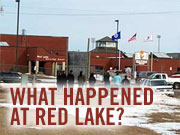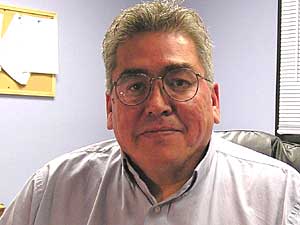Audio
Photos
| ||||||||||||||||||||||
Red Lake, Minn. — There's a feeling of uncertainty on the Red Lake Reservation. Pat Mills says people are on edge. They worry about their safety and the safety of their families. Mills says there are still a lot of unresolved emotions, and he worries it could lead to more violence.
"When you lose somebody, you're angry," said Mills. "You want to hold somebody responsible. It's easy to sit back and say, 'Well, I believe in the Lord and he forgave and I'll forgive.' But whenever it comes to someone you love deeply in your heart, it's hard to forgive. A lot of people haven't forgiven, and I don't think they ever will."
Mills was on medical leave at the time of the shootings. He'd had minor surgery just a few days before, and was resting at home under medication. Mills says he'll never forget the moment he first walked into the school.
"I guess one of the biggest things that hit me, that it was a reality, (happened) when I went into the school... and and noticed Mr. Brun on the floor," Mills said. "He was a former police officer here and I knew him very well and that was kind of a shock. After we found out that one of our fellow officers was also killed, that was another shock to all the department. So everybody kind of wiped their eyes a while and headed out and started to do their job."
Mills says the loss of fellow officer Daryl "Dash" Lussier and former officer and security guard Derrick Brun hit the department hard, as did the other deaths. In the days following the shootings there was little time for them to grieve. He says some have still not dealt with the trauma. But counseling is available for them, and they keep an eye on each other.
It's a challenging time for the 27 members of the Red Lake police force. Since the shootings, their duties have grown to include providing security at all of the schools, the hospital and the Boys and Girls Club. It's meant lots of overtime. Mills says the force is stretched thin.
"It's affecting us bigtime," he said. "When this whole tragedy happened on the 21st we met afterwards and we knew that we were going to have a bigger responsibility. I can see, though, as time goes on here, they're getting tired. And they need a break, too, sometime."
Mills says the shortage of officers since the shootings has meant the police department is not able to respond to some calls that were considered routine before. For example, he says, if someone locks their keys in their car or has a nuisance bear in their yard, they may be told to deal with it themselves. Mills says that's got some community members upset.
"You'll be surprised at some of the irate people we get when we tell them, 'No, we can't open your car door,' or, 'We can't go look for your daughter that you know took your car and went to the store and didn't come home,' you know," Mills said. "That's a parental responsibility, but people get upset about those things, because they're used to having us do those things."
There were special challenges to being a Red Lake police officer even before the shootings. Red Lake is a tight-knit community with intricate relationships and powerful family loyalties and Mills says that makes policing difficult. He says people are sometimes reluctant to report crimes or testify at trials, because they're afraid of retaliation.
"When you talk to people and they call something in, they don't want their name mentioned, they don't want their name over the radio, because they're just afraid that somebody will come back and do something to them," he said. "So it's still that fear."
|
It gives a signal of uncertainty. Where we're going? What's going to happen? Am I safe to leave my house? Am I safe to send my kids to school? You know, all of these things are a concern.
- Pat Mills
|
In the aftermath of the shootings, some people on the reservation had hoped the ordeal would pull the community closer together. In some ways that happened. Mills says violence and alcohol-related crime was down for awhile. But violence is part of life on the reservation. Some violent crimes happen at a higher rate there than in most places in the state. Mills says he doubts the shootings will be a real catalyst for long-term change.
"I don't believe that it's going to change a whole lot," said Mills. "I think a lot of people will be a little more open to some of the violence that happens here, and maybe try to understand where people are coming from. But when it gets to families, families are going to support family to the very end."
Mills says there's an uneasiness at Red Lake. The rumor mill has been active since the shootings. It's been fueled by media reports suggesting that teenage gunman Jeff Weise may have had co-conspirators. There are also reports that a larger group of people may have known an attack was being planned, but said nothing. FBI investigators have provided little information to quell the anxiety.
"It gives a signal of uncertainty," said Mills. "(People say) 'Where we're going? What's going to happen? Am I safe to leave my house? Am I safe to send my kids to school? Is it safe to send my kids to the store?' You know, all these things are a concern. And it may not never get back to where people feel, I feel safe. It's just, it's probably not going to happen. Is there light at the end of the tunnel? I don't think so, not at this point."
Mills says federal investigators don't always give him the latest details on their case but that hasn't been a big frustration. He's been careful to point out the investigation into the Red Lake school shooting is a federal case that belongs to the FBI. Mills has had conversations with investigators and federal justice officials. He says sometimes, he wishes it would happen more frequently.
"I guess I've always wanted to know more, simply because it's my responsibility to make sure that the officers are safe, the community is safe, the schools are safe," he said. "And I put my trust in the U.S. Attorney's office and the FBI that if it gets to a point that I need to know, they'll pick up the phone, they know how to get a hold of me and let me know."
The national attention given to Red Lake since the shootings may be good news for Mills and the police department. They've been operating out of a building that's been condemned for several years. Now the tribe is hoping the federal government will come through with funding for a new facility and money to hire additional officers.
There's also the issue of pay. Red Lake police officers earn less than other officers in the region. After the shooting, Red Lake police worked side-by-side with Bureau of Indian Affairs officers who were paid nearly twice as much as they were. Mills says that's hurt the morale of the force. He's hopeful the pay scale will be raised soon.
The spotlight on Red Lake is getting people talking about other important social issues on the reservation. There's a severe housing shortage. There are infrastructure needs. There's rampant poverty and unemployment.
The tribe's immediate focus is on providing recreational and development activities for kids this summer. Mills says beyond that, the best thing that could happen for kids is if parents were held more accountable. He says families need to teach children to have respect and to show kids they can achieve a better life for themselves. Mills says those problems aren't as easily solved.
"If I had the answer, I guess I wouldn't be sitting here talking to you," said Mills. "You know, that's all we can do is try, and move on. Because the world is going to go on, and we've got to go along with the world. Our community is going to survive. It will pull together, and we'll move on. The scar is still going to be there, and it will probably be there forever."
Mills says the additional pressures his police department has faced has put the force way over budget. He's been working with officials from the Minnesota Department of Public Safety on emergency funding to help with overtime pay and other expenses related to the shootings. Mills says he's optimistic he'll receive that funding in the next few weeks.





